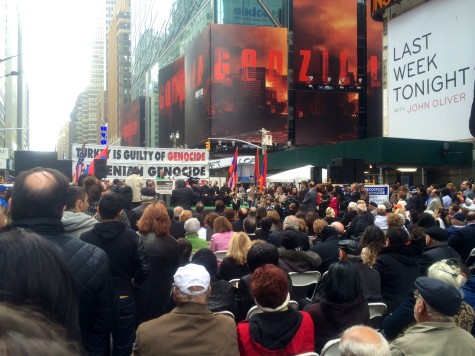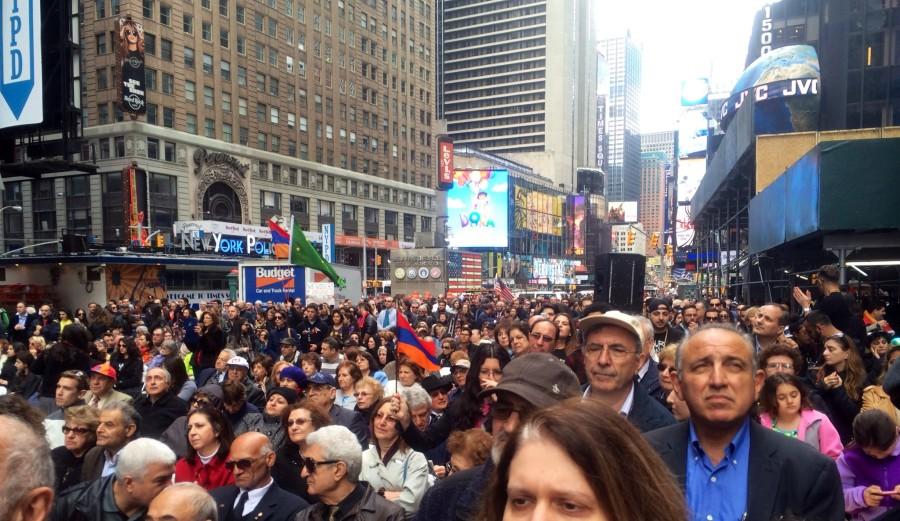Remembering 1915: Our wounds are still open
Photo Credit: Tamar Tezcan
For 99 years, the Armenian Genocide has been commemorated on the 24th of April.
May 9, 2014
The mission of the Ottoman Turks was simple: to exterminate the Armenian population as a whole.
Beginning on April 24th, 1915, 1.5 million innocent Armenians were brutally murdered at the hands of the Ottoman Turks. Since then, April 24th is a day when the Armenian Genocide is commemorated worldwide.
As early as 1909, though, Turkish leaders had a plan to exterminate anyone who was not Turkish or who was unwilling to convert. WWI was the perfect opportunity for the Turkish leaders (Young Turks) to begin a systematic extermination of the Armenian people.
Armenian leaders were gathered and killed beginning on April 24th. After the intellectuals had been rounded up, women, children, and the elderly were rounded up and forced to leave their homes while being deported to deserts.
“This subject should be taught more in detail in schools and referred to as a genocide. People need to understand that the entire Armenian population was almost wiped out,” said sophomore Bennie Fontana.

From 1915-1923, over 1.5 million Armenians out of the 2 million living in the Ottoman Empire were slaughtered.
The remaining 500,000 Armenians were unable to go back to their homes and needed to start a new life somewhere else. Most fled to Lebanon and Syria, while others escaped to different parts of Europe and the United States.
After 99 years of denial, the Armenian Genocide has yet to be recognized by the Turkish and U.S. Government. With the centennial anniversary quickly approaching, the Armenian diaspora has one goal: U.S. and Turkish recognition of the Armenian Genocide.
“The Armenian Genocide should be taught more in school because although the holocaust during WWII was awful, people need to be informed of other cultures that are harmed by genocides, not only the genocide of the Jewish people,” said sophomore student Meghan O’Neill. “I didn’t even know that Armenia existed, or that the Armenian Genocide ever occurred before I met an Armenian friend.”
Armenians all around the world believe that the souls of their ancestors cannot peacefully rest without the proper recognition of these atrocities.
“But still the U.S. position is still kept ambiguous about using the word genocide because our country fears alienating Turkey, an important country in the Middle East,” said President Barack Obama, in a statement he made commemorating the Armenian Genocide on April 24, 2013.
“This needs to be acknowledged because we learn so much about the Holocaust, so we should learn about other genocides including the Armenian Genocide because it eliminated a mass amount of Armenians,” said sophomore student Ari Berke.
The Armenians located in the diaspora have played a major role in educating the world about the tragedies of 1915. They have taken the issue to social media to such an extent that #ArmenianGenocide and #TurkeyFailed were trending on Twitter, Facebook, and Google multiple times.
There is a tradition that has been held for many, many years as a commemoration of the Armenian Genocide in Times Square, NY.

Every year, usually the Sunday before or after April 24th, thousands of Armenians gather in the heart of New York City to remember and bring awareness to the atrocities that occurred almost a century ago.
“I would love for the Armenian Genocide to be recognized soon so that my grandparents can see it happen in their lifetime,” said Alec Mazbanian, junior student at Bergen Catholic High School. “It’s not fair that the Armenian issue gets overlooked by the U.S. Government because Turkey is an ally to the United States.”



